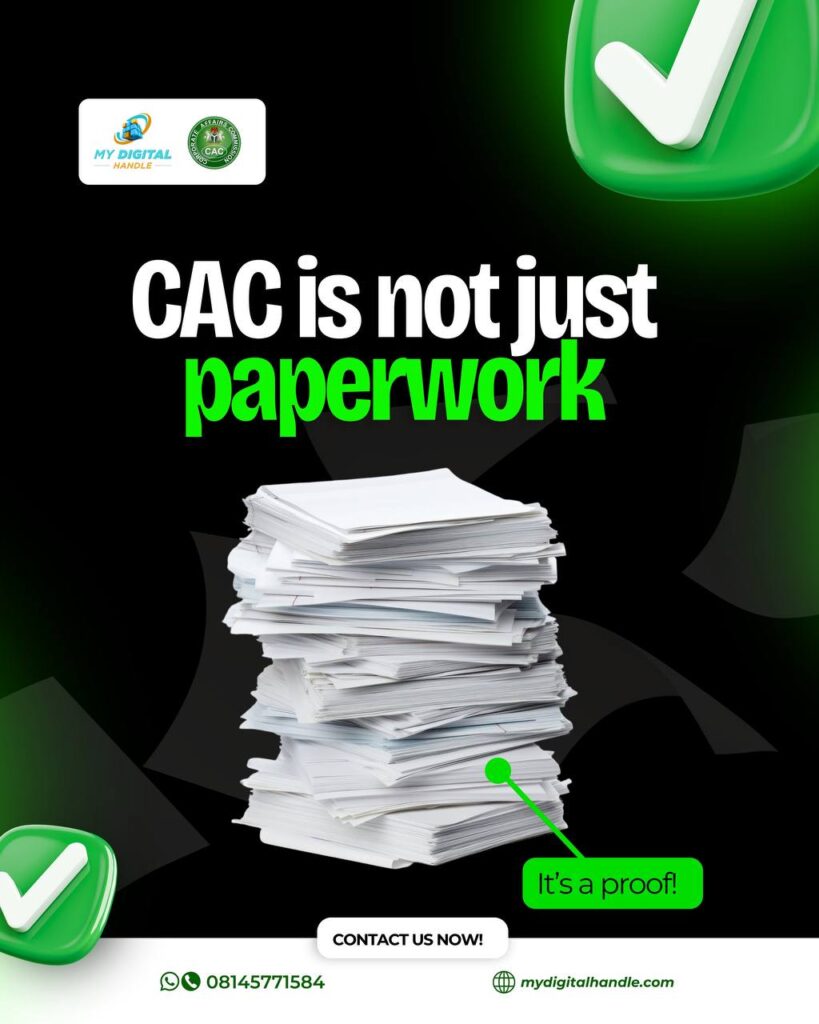
If you’ve been running your business without official registration, you’re not alone. Many small business owners in Nigeria start this way — they just want to “test the waters” before spending money on CAC registration.
But here’s the truth: registering your business isn’t just a formality — it’s one of the smartest investments you can make for your growth and protection.
Whether you’re running a fashion brand, POS business, restaurant, or online store, registering with the Corporate Affairs Commission (CAC) gives you credibility, access, and peace of mind that an unregistered business will never have.
In this post, we’ll walk you through 10 surprising benefits of registering your business that most entrepreneurs don’t know. Let’s dive in.
1. It Makes Your Business Legally Recognized
Once your business is registered with CAC, it becomes a legal entity in Nigeria. This means your brand officially exists in the eyes of the law.
With your Business Name Registration Certificate (or Certificate of Incorporation for companies), you can operate anywhere in the country without fear of being shut down or penalized.
Government agencies, banks, and corporate clients only deal with legally recognized businesses — and registration is how you get that status.
2. Builds Instant Credibility and Trust
Let’s be honest: Nigerians are becoming more careful about where they spend their money. With so many online scams and fake vendors, customers want to see proof that your business is real.
When your business is registered, you appear more legitimate and trustworthy. You can display your business name with pride — on your website, invoices, or packaging.
Even if you’re a small brand, having your CAC certificate gives your customers confidence that you’re serious, stable, and reliable.
3. Helps You Open a Corporate Bank Account
Banks in Nigeria require CAC documents before they allow you to open a corporate bank account (like GTBank, Access Bank, Zenith Bank, etc.).
This type of account makes your business look professional and keeps your personal and business finances separate.
For example:
- Instead of receiving payments in your personal account (which can look unprofessional), you can get payments in a name like “OluTech Enterprises” or “Luxe Skin Glow Ltd.”
- It also helps with easier accounting, tax filing, and financial planning.
Without registration, this door remains closed.
4. Access to Loans and Government Grants
If you ever plan to grow your business, access to funding is key. Many entrepreneurs miss out on financial support simply because they’re not registered.
Financial institutions, microfinance banks, and government programs like SMEDAN, BOA, or CBN Empowerment Schemes only give loans or grants to registered businesses.
Once your business is registered, you can apply for these programs with your CAC certificate, Tax Identification Number (TIN), and business bank account.
This can be a game-changer for expanding your business or getting new equipment.
5. Protection Against Name Theft
Imagine building a brand name for years, only for someone else to register that same name and legally claim it. It happens all the time.
Registering your business name with CAC protects your brand identity. Once it’s approved, no one else can legally register or use that same name.
This means your logo, website, and brand identity are safe — and you can build your brand with confidence.
6. Easier Access to Corporate Clients and Partnerships
Large companies, NGOs, and government agencies prefer to work with registered businesses only.
So, if you plan to get contracts, supply deals, or partnerships in the future, registration isn’t optional — it’s mandatory.
For example, if you’re a digital marketer, designer, or event planner, some corporate clients will ask for your CAC certificate and Tax ID before signing any deal.
With registration, you instantly look more professional and are taken seriously in the business world.
7. Makes Getting Your TIN and Other Documents Easier
Once your business is registered, it becomes easier to get your Tax Identification Number (TIN) from the Federal Inland Revenue Service (FIRS).
A TIN is essential for filing taxes, applying for government contracts, and running a compliant business.
Registered businesses can also get access to other important documents like:
- Business name registration certificate
- Certificate of incorporation (for LLCs or NGOs)
- MEMART (Memorandum and Articles of Association) for companies
These documents are useful for opening accounts, applying for grants, or doing international business.
8. It Makes Expansion Easier
When your business grows and you want to add new branches, import goods, or attract investors, being registered gives you a smoother path.
A registered business can scale into a limited liability company (LLC) or even an NGO, depending on your future goals.
Investors and partners prefer working with registered businesses because they know your operations are structured and traceable.
Registration today saves you the stress of starting all over later when you want to expand.
9. You Can Bid for Tenders and Contracts
Government and private organizations often publish calls for tenders — opportunities to supply goods or render services.
But here’s the catch: only registered businesses can apply.
Having your CAC certificate, TIN, and sometimes SCUML or NSITF documents opens the door to these lucrative opportunities.
If your business isn’t registered, you’ll automatically be disqualified, no matter how capable you are.
10. Peace of Mind and Business Continuity
Finally, registration gives you peace of mind. You’re no longer afraid of authorities, competitors, or being seen as “illegal.”
You can proudly display your certificate, pay your taxes, and operate freely.
And if anything happens to you, your registered business can continue legally under your next of kin or partners — something unregistered businesses can’t do.
That’s long-term stability that protects both you and your loved ones.
Bonus Tip: Register Your Business the Right Way

There are different types of registration depending on your business structure:
- Business Name (₦45,000) – For small businesses, freelancers, and startups.
- Limited Liability Company (₦100,000) – For medium and growing businesses.
- NGO / Incorporated Trustees (₦250,000) – For charities, foundations, or social causes.
At MyDigitalHandle, we help you register your business quickly, correctly, and stress-free. From name search to TIN, we handle everything while you focus on running your business. Reach to us today!
Frequently Asked Questions (FAQs)
1. Can I register my business myself?
Yes, you can, but it’s better to work with a CAC-accredited agent like MyDigitalHandle to avoid mistakes and delays.
2. How long does registration take?
Usually 3–10 working days, depending on the type of business and CAC approval speed.
3. What documents do I need to register?
A valid ID, passport photo, address, and business name options. For companies, you’ll also need shareholder and director details.
4. Do I need to register before opening a shop or POS?
Yes. CAC registration is now mandatory for PoS and most retail businesses in Nigeria.
5. Can I change my business name later?
Yes, you can apply to CAC for a change of name, though it comes with an extra fee.

